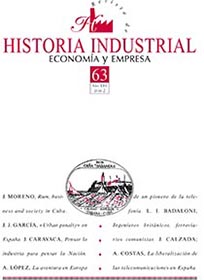Telecommunications liberalization in Spain: European objectives versus national interests
DOI:
https://doi.org/10.1344/rhi.v25i63.21205Keywords:
telecommunications, Spain, European Union, liberalization, inflation, universalization, TelefónicaAbstract
This paper analyses the liberalization of the telecommunications sector in Spain in the period 1987-2003. Our main hypothesis is that although liberalization was imposed by the European authorities, the strategy adopted and steps taken by the Government to open the market were importantly determined by two objectives of the national economic policy: the universalization of the service and the anti-inflationary policy oriented toward entrance into the European Monetary Union (EMU). Identification of the national political interests at each point in time led the Government to block or accelerate liberalization according to the European calendar. This political use of liberalization is essential to understanding the telecommunications policy of this period. We also argue that the subordination of telecommunications policy to the anti-inflationary policy caused a delay in Telefonica’s tariff rebalancing. Finally, we explain how telecommunications policy was affected by national policy objectives. Initially, a model of infrastructure competition was introduced, but it was soon reformed due to a lack of competition and investment. Thus, a more pragmatic strategy was adopted, based on access to Telefonica’s local loop.Downloads
Downloads
Published
How to Cite
Issue
Section
License
The author assigns all rights to the publisher. Creative Commons
The author who publishes in this journal agrees to the following terms:
- The author assigns all intellectual property rights exclusively to the publisher for the entire duration of the applicable intellectual property rights.
- The publisher will distribute the texts under the Creative Commons Attribution License, which allows others to share the work, provided that they acknowledge the authorship, its initial publication in this journal, and the conditions of the license.





